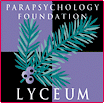 |
 |
| Click here for a French version of this blog
PF Lyceum Blog #3, October 20th, 2005 Carlos S. Alvarado, Ph.D. (Before starting the discussion, prospective parapsychologists should read my previous two blogs about What is Parapsychology and Parapsychology as a Profession.) If you want to work in parapsychology you need to be aware from the beginning that it is very hard, sometimes impossible, to make a living in this field simply because of the lack of full-time employment opportunities. As Rex Stanford said in 1984, but which is still relevant today: “Anyone considering a career in this field should recognize at the outset that the opportunities for full-time employment in parapsychological research are sufficiently few that they are essentially nonexistent”. (Click here for Stanford’s complete article; click here for a bibliography about aspects of the profession; and click here for Matthew D. Smith’s article “Educating Parapsychologists”.) This does not mean it is impossible to find a job, but only that it is important to give a word of caution about the reality of the situation. As I will discuss later, you may improve your opportunities for work in parapsychology by adopting some of the following strategies. If you want to get into the field you may wonder what steps to take first. To me, the first step is making sure that you are interested in the scientific and scholarly approach to the topic. Many of us in the field have encountered people who think they want to get into parapsychology, or who think they are already doing parapsychology, but who are, nonetheless, basically unaware of the scientific and scholarly nature of parapsychology. If your main interest is the thrill of the “paranormal,” a desire to develop psychic abilities, a need to go against the grain by embracing the unconventional, or you are someone who is interested in quick solutions or answers, parapsychology is not for you. Before you do anything, make sure you understand what parapsychology consists of, something you can do inspecting the general introductory books available today. A good resource is the Parapsychology Foundation’s Bibliography No. 1, “Introductions to Parapsychology”, and another is my first blog, What is Parapsychology. Once you are sure you know what parapsychology is all about, you need to start thinking about your qualifications (the following is addressed mainly to those young people who do not have a profession yet, although the same general issues may apply for others). To prepare for a work in parapsychology you should obtain a college education, preferably a doctoral degree. Doctoral training is very important because it provides you with advanced education and training in a particular discipline, something you may apply to parapsychology. While you may be able to contribute to the field without a graduate degree you will probably find that there are skills and perspectives needed for your work that only formal study can provide. Furthermore, there is a credibility issue. Your work will also command more attention and respect if you have a graduate degree. It will be very difficult, sometimes impossible, to obtain research positions and grants without a graduate (post-graduate) university education. Of course there have been cases in which individuals have made contributions to parapsychology without having college degrees: Neither creativity, nor certain skills are the sole province of graduate school. But the point is that your life will be harder without conventional credentials. I do not know of any place I would recommend today to get a graduate degree in parapsychology. I am referring to a degree in the field that will expose you to the main areas of parapsychology, and give you training to be able to conduct research and to understand the research conducted by others. Nonetheless, there are some universities that will give you some training in the field as well as the opportunity of conducting parapsychological research for a thesis or a dissertation, but the degree on offer is one in psychology (or in another discipline), not in parapsychology. (See Advice to the Beginning Student for more on this topic.) Many workers in parapsychology, myself included, tend to recommend that prospective students should pursue graduate degrees that will qualify you in areas other than parapsychology. Traditionally, the possibilities for employment for an academic career or for a career outside academia are better if your dissertation is on a non-parapsychological topic. (See Thesis and Dissertation Topics for more on this.) It is also better if you have a track record of teaching and publishing research on other topics. There are, of course, exceptions to this, mainly in the United Kingdom. Thanks to the efforts of the late Koestler Professor of Parapsychology Robert L. Morris at the University of Edinburgh several students with psychology Ph.D. degrees, whose degrees were granted for doctoral research on parapsychological topics, have obtained faculty and research positions in university psychology departments. Most people who conduct parapsychological research are part-timers. Even the research units in British Universities have very few individuals who can devote all their time to parapsychology. (See the Society for Psychical Research’s “Research Directory” for a list of these.) So if you have a stable profession in another discipline from which to work in parapsychology, then you may be in a good position both to make a living and to contribute to the field. In fact, some believe that instead of identifying yourself with parapsychology as a discipline, you should instead became a professional in another discipline and then work on parapsychological topics from that perspective. What you choose to study in graduate school depends on at least two issues. One is what you are truly interested in. People choose to study anthropology, biology, engineering, medicine, philosophy, physics, psychology, sociology, or other disciplines on the basis of personal inclinations and relevance to life concerns. But you can also choose a discipline based on your interests in parapsychology. Psychology and physics are particularly relevant if you want to specialize in the study of psychological and physical aspects of psi phenomena. Similar considerations apply for other interests in anthropology, history, philosophy, psychiatry, and sociology, among others. But regardless of what specific field or area interests you, anyone involved in parapsychology should have understand the scientific method and statistical analysis. Not only are these important for many areas of parapsychology, but the student of parapsychological literature will need this knowledge to keep abreast of (and understand) the contemporary parapsychological research literature. If you decide to work on a parapsychological topic for a dissertation, you need to make sure that your supervisors are acquainted with the problems and literature of the field. As Harvey Irwin has said, any student who works “under a supervisor who does not have a first-hand acquaintance with the field would run a substantial risk of fatal conceptual or methodological flaws appearing in the thesis …” (quoted from “Parapsychology as a Career,” Australian Journal of Parapsychology, 2001, 1, 2-8). A recent dissertation I am aware of presented a view of parapsychology mainly from secondary sources, showing that the student had not mastered the relevant primary sources. But because the dissertation was accepted it was also obvious that the dissertation committee did not include anyone with the required knowledge of parapsychology to guide the student. Of course, once you are in a particular university you depend on the available faculty members and even those programs that have external dissertation examiners do not give you the chance to select that person. But if you do your homework from the beginning you may select a university that has individuals qualified in our literature. Before applying to graduate programs you should check around to see if you can work with well-known people in the field. Browsing university department websites and the web pages of particular individuals known to you will be of great assistance in this endeavor. Before you apply to any institution, I encourage you to contact people who you think may supervise your work if you are accepted into the university program. You will be evaluated on several criteria when you apply for admission, but before you apply you may also evaluate the persons you think you might work with, using the criteria I have suggested in Criteria to Evaluate Professors. Once you know the area you want to work in you should check the specialized journals of the field. For a list of journals, click here and scroll down. You should also check the journals of other fields to find individuals who have conducted work that interests you. While a formal university experience is invaluable for research training, most of your learning of the parapsychological literature will come from self-study. (See Self-Study in Parapsychology for more information on this.) There is a difference between research training and a general education in parapsychology (for a discussion of the topic see the section “Education and Training in Parapsychology” in one of my recent articles by clicking here and scrolling down.) An education includes more than training in research techniques. A good education in the field will include such issues as an understanding of the terminology and variety of phenomena in the field, and general knowledge about parapsychology’s historical development, its theoretical models, and social and cultural aspects. Every field has a unique tradition and parapsychology is no exception. As discussed in Parapsychology as a Profession, you may be able to contribute to parapsychology in many ways. You do not necessarily need to be a scientist who collects data to be analyzed using quantitative or qualitative techniques. There are many scholarly approaches used in disciplines such as history, literature, philosophy, and religious studies that can provide contributions to the field. (See, Important Scholarly Contributions to Parapsychology for more on this topic.) In other words, you can be in parapsychology, and make important contributions, without conducting scientific research. But regardless of what you decide to do, make sure that you are prepared to earn a living for yourself and your family, and that in addition, you have the necessary training and education to make contributions to the field. |
 |

|
 www. parapsychology. org |
||